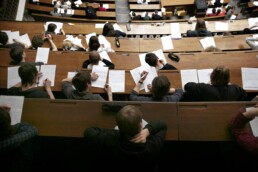I often thank God for my learning and educational experiences. I never had a teacher who expected that I simply rote-learn, that I memorise the writings of others with the intent to regurgitate it when asked a question. One teacher once counseled me not to memorise texts written by scholars, but to aspire to become a scholar with his own authored texts. Every single tutor or teacher I’ve ever had expected me to critically engage the issues being studied, understand where jurists, historians, theologians or hadith scholars were coming from, to pinpoint the locus of the issue, learn to identify the operative variables, consider the function of the discussion in the real world, and form holistic opinions in light of everything else I ought to know.
I benefitted from them greatly and I’ve always considered the reasons as being:
1. I never opted to study with teachers because they were famous. I remember reading al-Ghazzali putting it that to seek out famous teachers was a sign of arrogance. Furthermore, the more famous they were, the more busy they’d be and you were unlikely to get a considerable amount of their attention. So I’d seek out those who were known amongst their peers, but relatively unknown to others. They would have a wealth of knowledge AND time to give.
2. I’d prioritise practitioners over theoreticians. I wasn’t looking for an academic that could quote ancient scholars (I could read all that for myself) but those who might be able to show me how to bring knowledge to life – how to operationalise the ideas of ancient moralists. Of course, studying in the Middle East meant my teachers’ context was very different to mine, but through studying practical examples, I could deduce methods (and critique them) through practical observation.
3. I wasn’t particularly shy (probably too much of a big mouth!). If I didn’t get something I’d say so, looking stupid was irrelevant. I was there to learn, not know it all. I didn’t argue, but I explored and asked questions, and started from the basic assumption that anything challenging I’d put to them they had probably already contemplated it (even if it wasn’t always the case). I noticed their appreciation for intelligent questions, especially those that’d cause them to probe deeper, or consider variables they hadn’t before. Many told me they benefitted from our engagements more than I did. When I eventually started to teach, I saw what they meant.
4. I always paid my teachers, or found a way to meet some of their needs/burdens. Nothing meaningful in life is free/requires absolutely nothing from you, and it’s only by supporting the source of benefit can the benefit be maintained and grow to be even more beneficial.
5. I pursued an organic curriculum. I spent a long time thinking about two things: what to learn, and how to learn it. Anything can be acquired and operationalised in variant ways. I decided what I wanted to do, and this inevitably shaped what I needed in order to do it. From there I’d take traditional curriculums and tweak them for my particular objectives. Of course, this organic mode can actually be quite challenging for most people, and being socialised in institutional settings means that most of us wouldn’t know where to begin – we simply rely on prepared curricula. I acknowledge I had good people to spend hours discussing these things with.
6. I didn’t assume my teachers would spell everything out for me. I didn’t want them to, I wasn’t a child. I was intellectually mature and started to study the shari’ah after having graduated from British universities and already engaged in the field of intellectual enquiry. MY job was to learn and come to a lesson prepared (armed with questions and a critical analysis of what I’d pre-read). THEIR job was to help me delve deeper and highlight what I missed or could have reasoned better. In this way, I was trained and cultivated rather than spoonfed and infantilised. Unfortunately and quite often, “traditional” studies is merely having a book read to you which is very bizarre since that only happens to us here in primary school.
7. All of my teachers took a socratic method to teaching (as I also do) rather than simply lecturing me. They’d invite debate. They’d stir discussion. They’d challenge, play devil’s advocate. They’d test the limits of my knowledge and inspire me to learn more, think deeper, and come back stronger. They NEVER expected me to simply mimick. They seemed to want independent thinkers to solve problems in a unique way and truly appreciated ingenuity – they weren’t into producing robots. As one said to me, “if it was merely about saying what’s already been said, there’d be no problems to solve!”
8. My teachers had expectations and standards. They expected that we’d memorised the Qur’an, certain books of hadith, or principles of grammar/usul etc. That way they’d get to engage at a certain level instead of explaining everything they were referring to from first principles which considerably slows down the conversation and limits the depth of enquiry. All of my teachers engaged with me and the knowledge at a post-grad level, for them this was the standard and an expectation for those in training. Even those who taught me the basics in the beginning did so in an advanced way, they refused to dumb things down (and I wouldn’t have appreciated it if they did).
9. I did not mythologise them. I saw my teachers as human beings, more learned than I in particular subjects, but as with all humans, room for growth. That meant I didn’t just cling to anything they’d say (they didn’t want me to) but would take take a views with considered and measured reservations and seek time to deeply critically consider their propositions. Again, this was also because a) I was an adult, and b) I had already graduated in the humanities and social sciences so I had the ability to critically engage sensibly.
10. I wasn’t sectarian in my choice of teachers. I’d study with scholars from various schools of law, theology, and denominational persuasions. As long as they specialised in a particular field, studying with them in that field was beneficial.




